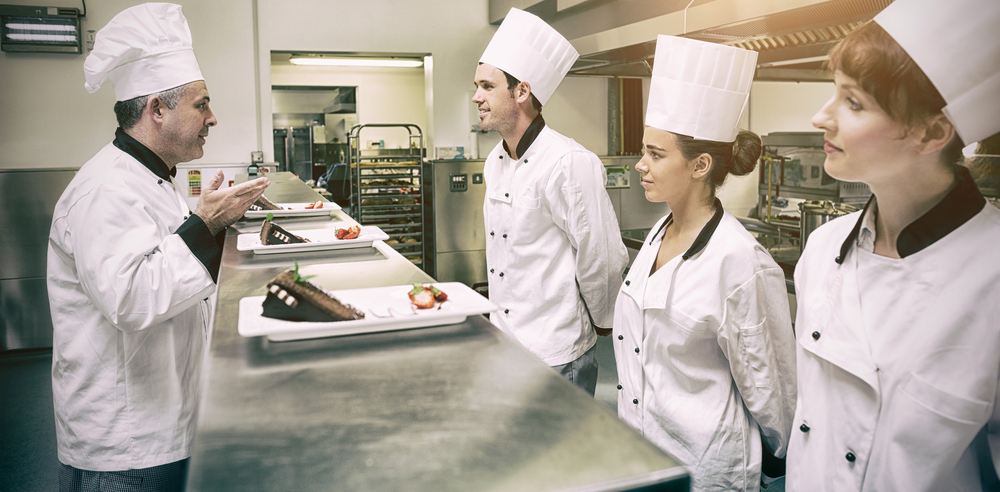Executive Chef Job Description

What Does an Executive Chef Do?
A executive chef is a professional who is in charge of the culinary operations of a restaurant or other food service establishment. They are responsible for managing kitchen staff, creating menus, controlling food costs, maintaining food quality, and developing recipes.
Executive Chef Job Description Example
The Gourmet Peach Cafe is a restaurant in Atlanta serving delicious Southern-inspired dishes with a modern twist. We’re looking for an experienced Executive Chef to lead our kitchen team and create delicious meals that our customers can’t wait to return for.
Duties and Responsibilities:
The Executive Chef will be responsible for:
- Developing and creating menus
- Training and managing kitchen staff
- Monitoring inventory and ordering food and supplies
- Overseeing daily operations in the kitchen
- Maintaining a safe and sanitary work environment
- Maintaining the highest standards for food preparation
- Enforcing proper food handling protocols
- Meeting budget targets and ensuring cost-effectiveness
Work Hours and Benefits:
The Executive Chef will be expected to work full time, including weekends and evenings. Benefits include competitive salary, health insurance, vacation time, and dining discounts.
Qualifications:
- Proven track record as an Executive Chef in a restaurant environment
- Knowledge of food safety regulations
- Experience generating and managing budgets
- Ability to lead, motivate, and mentor kitchen staff
- Exceptional customer service skills
Training and Education:
The ideal candidate should have a degree in Culinary Arts or related field and at least 5 years of kitchen management experience. Any experience with catering services is a plus.
If you’re passionate about food, excellent at managing a team, and want to join a growing restaurant in the heart of Atlanta, please apply now. We’d love to have you on board!
What to Include on an Executive Chef Resume or Job Posting
Common executive chef responsibilities
- Developing and creating new recipes and menus.
- Ensuring that all food is prepared to the highest standards of quality and safety.
- Managing and training kitchen staff.
- Maintaining a clean and organized kitchen.
- Monitoring food costs and controlling inventory.
- Establishing and enforcing food safety and sanitation standards.
- Developing and implementing food cost control systems.
- Negotiating contracts with suppliers and vendors.
- Developing and maintaining relationships with customers.
- Ensuring compliance with all applicable laws and regulations.
Qualities & traits
- Leadership: An executive chef must be able to lead and manage a kitchen team, delegate tasks, and ensure that all staff are working together efficiently.
- Communication Skills: An executive chef must be able to communicate clearly with their staff and customers.
- Creativity: An executive chef must be able to come up with creative and unique dishes that will keep customers coming back.
- Attention to Detail: An executive chef must be able to pay close attention to detail when it comes to food preparation and presentation.
- Time Management: An executive chef must be able to manage their time effectively in order to meet deadlines and keep the kitchen running smoothly.
- Passion: An executive chef must have a passion for cooking and a desire to create delicious dishes.
- Knowledge: An executive chef must have a thorough knowledge of food safety and sanitation guidelines.
What a typical day looks like for a executive chef
A executive chef is responsible for the overall operation of the kitchen, including menu planning, recipe creation and storage, food preparation and procurement, kitchen staff supervision, and ensuring quality standards for food and hygiene is met. On a daily basis, they are usually responsible for both administrative duties, such as ordering supplies and training staff, and cooking tasks, such as creating or checking recipes and tasting dishes. Executive chefs must continuously assess their team and adjust their strategies to ensure efficient and consistent meal production. In addition to their responsibilities during meal service, they often oversee other areas of operations, such as sanitation and safety protocols.
Compatible jobs and work history
An executive chef is a key leader in the kitchen of a restaurant, hotel, or other foodservice establishment. It is an advanced role that requires strong culinary, managerial, and interpersonal skills. While executive chef experience is ideal, there are numerous other roles and industries that can help develop these competencies and prepare a person to become an executive chef. These include positions in the culinary, hospitality, and service industries such as restaurant cooks, food preparation technicians, sous chefs, banquet chefs, catering chefs, private chefs, food and beverage directors, executive housekeepers, and hotel general managers. All of these jobs and roles allow individuals to hone their culinary skills, manage staff, and develop their knowledge of the hospitality and service industry.
Compatible Job Titles:
- Restaurant Cook
- Food Preparation Technician
- Sous Chef
- Banquet Chef
- Catering Chef
- Private Chef
- Food and Beverage Director
- Executive Housekeeper
- Hotel General Manager
- Restaurant Manager
Similar Job Descriptions
Are you hiring? Our job description templates allow you to research, draft, and post your exciting job opportunity in minutes. Here are some jobs in the same industry as Executive Chef:
- Lifeguard Job Description
- Restaurant General Manager Job Description
- Concierge Job Description
- Chef Job Description
- Restaurant Server Job Description
- Cart Attendant Job Description
- Night Auditor Job Description
- Waitress Job Description
- Restaurant Manager Job Description
- Dishwasher Job Description
- Sous Chef Job Description
- Busser Job Description
- Line Cook Job Description
- Dietary Aide Job Description
- Barista Job Description
- Prep Cook Job Description
- Bartender Job Description
- Valet Job Description